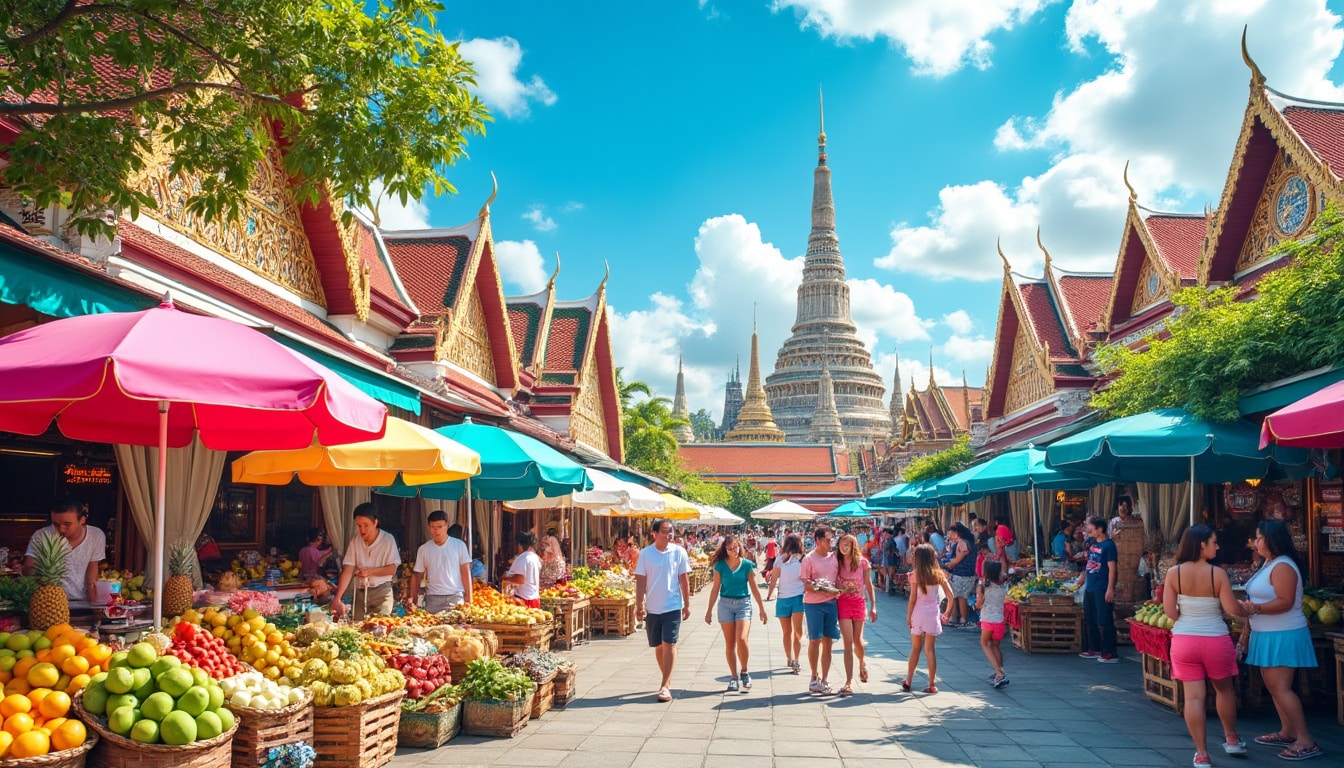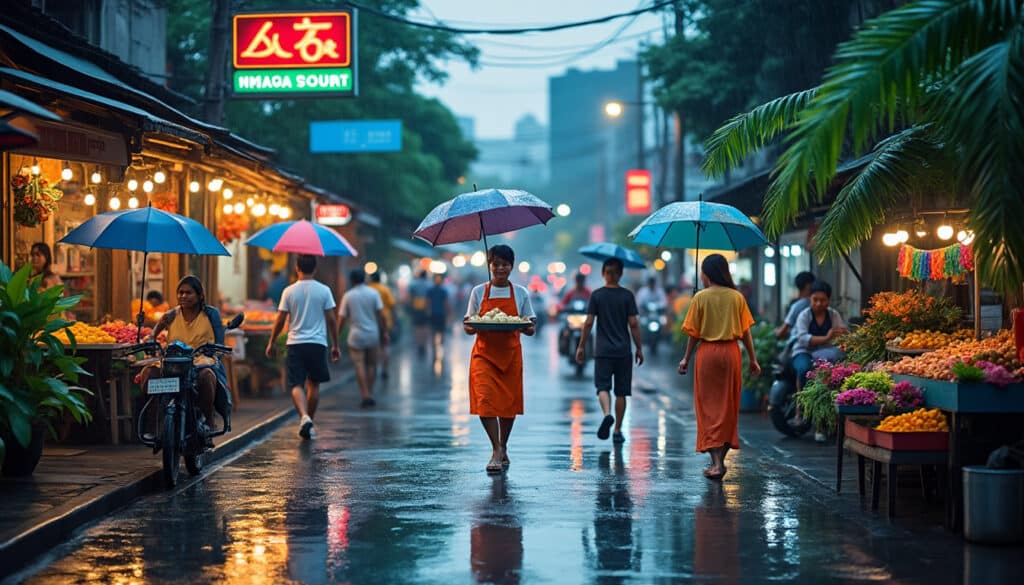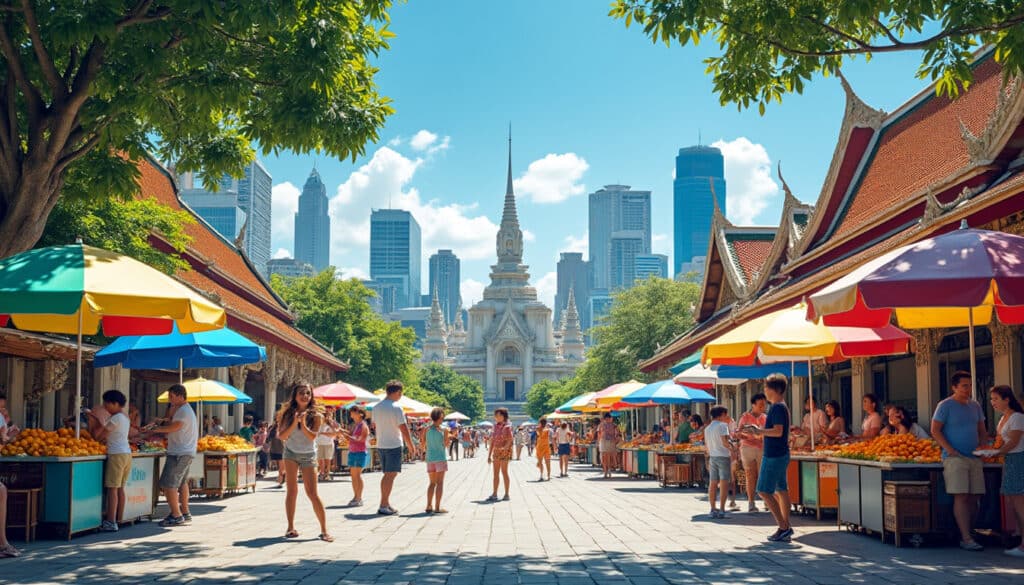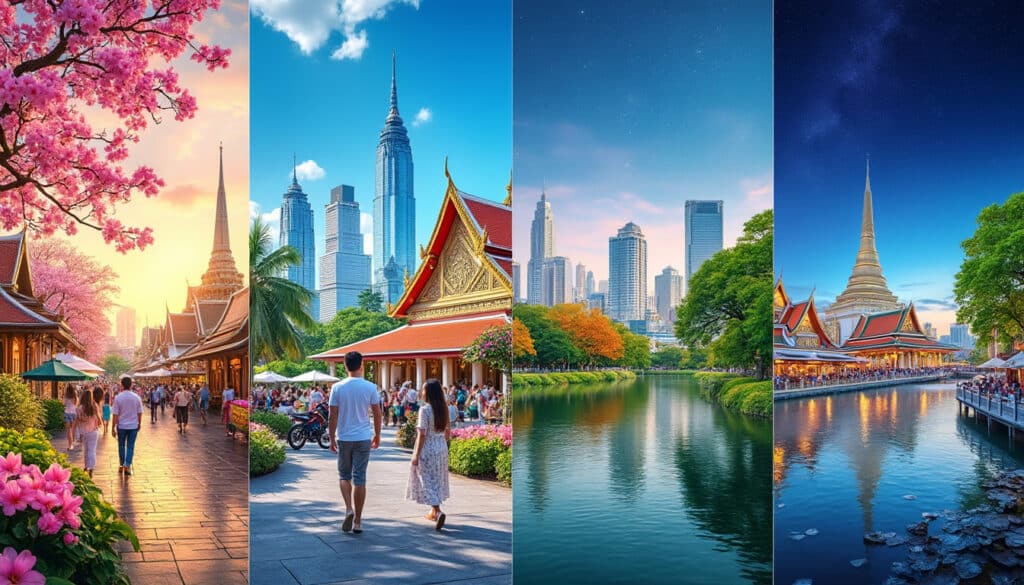As a bustling metropolis known for its vibrant street life and cultural landmarks, Bangkok also boasts a distinct tropical monsoon climate. This climate makes it a year-round destination for travelers from around the globe. The city’s unique weather conditions are a significant element to consider when planning a visit. Over the course of the year, Bangkok’s temperature remains relatively constant, with only minimal variations in its hot, humid, and occasionally rainy environment. Understanding Bangkok’s climate can enhance the experience of sightseeing and exploring its numerous attractions, from the majestic Grand Palace to the vibrant floating markets.
The Tropical Climate of Bangkok
Bangkok finds itself in a tropical region, characterized by high temperatures and significant humidity throughout the year. The climate is classified as a tropical monsoon (Aw) under the Köppen-Geiger climate classification. This means the city experiences hot and humid conditions consistently, with a marked wet season. Bangkok’s proximity to the equator results in very warm weather year-round, with average daylight temperatures falling between 26°C and 30°C.
In Bangkok, average temperatures hover around 27.7°C (81.9°F) annually. During the day, temperatures can soar to around 35°C (95°F), especially during the peak of the dry season. However, the evenings are relatively cooler, with temperatures occasionally dipping below 25°C (77°F). This consistency in warmth is why many refer to Bangkok as a haven for those seeking sun and warmth any time of the year.
The city’s wet season, extending from May to October, sees an uptick in precipitation, with September typically being the wettest month, receiving an average of 244mm of rain. Despite the heavy rains, these downpours are often brief and are typically followed by clearer skies, making it possible to continue exploring with only minor disruptions.
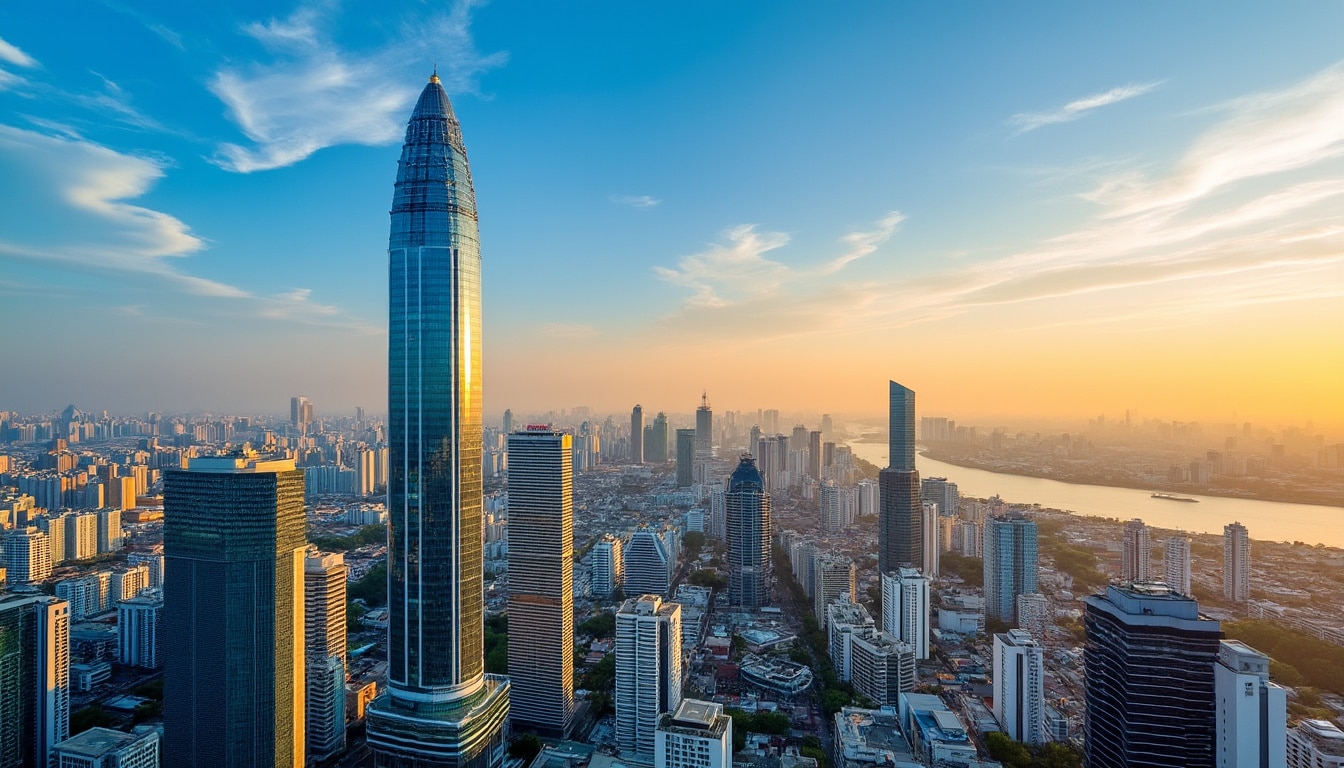
Bangkok’s climatic conditions present a blend of diverse experiences for both residents and tourists alike. This can be particularly observed in its vibrant outdoor market scenes, which remain bustling even during the rainy season, thanks to the brief nature of the downpours.
Influences of Climate on Daily Life
The tropical conditions significantly influence daily activities in Bangkok. Residents and visitors alike adapt their schedules and attire to suit the climate. Light, breathable fabrics such as cotton are a staple, and accessories like wide-brimmed hats and sunglasses are commonly seen. The heat also drives a vibrant street food culture, with carts offering refreshing local treats like coconut ice cream and iced Thai tea, perfect for keeping cool.
Beyond personal adaptations, the climate also impacts transport and logistics. The rainy season can lead to some flooding, affecting commutes and requiring adjustments in travel plans. However, the city is well-equipped with infrastructure solutions to manage the effects of its climate, ensuring that daily life and tourism activities continue smoothly.
Bangkok’s climate is not just about heat and rain; it’s also an essential factor in shaping the city’s culture and identity. From its bustling markets to its serene temples, the weather plays a critical role in influencing the rhythm of life in this dynamic city.
The Seasonal Variations in Bangkok’s Climate
While Bangkok enjoys warmth all year, it experiences subtle changes between its seasons, which influences the overall vibe and activities available. The climate is primarily divided into the dry and rainy seasons, each contributing uniquely to Bangkok’s allure.
The dry season spans from November to April and is generally regarded as the best time to visit. During this period, temperatures are more comfortable, ranging from 25.9°C (78.6°F) in December to 29.9°C (85.8°F) in April. The relative humidity is also manageable, starting at 60% in December and gradually rising to 69% by April. Tourists can enjoy up to 10 hours of sunshine a day, perfect for exploring attractions such as the Chatuchak Weekend Market or taking a serene boat ride along the Chao Phraya River.
The table below provides a snapshot of Bangkok’s average temperature and rainfall across the months:
| Month | Avg. Temperature (°C) | Max. Temperature (°C) | Rainfall (mm) | Humidity (%) |
|---|---|---|---|---|
| January | 26 | 31 | 18 | 63% |
| February | 27.4 | 32 | 15 | 67% |
| March | 28.8 | 33 | 45 | 68% |
| April | 29.9 | 34 | 72 | 69% |
| September | 27.3 | 31 | 244 | 81% |
| December | 25.9 | 31 | 10 | 60% |
During the rainy season, however, the dynamic changes. Rainfall is at its peak, particularly between May and October. This season sees a spike in humidity levels, reaching up to 81% in September. Despite the rain, mornings can often be clear, making it a good time to explore city landmarks before afternoon showers.
Travelers visiting Bangkok during the rainy season can take advantage of lower hotel prices and thinner crowds at popular sites. This makes deep exploration of the city’s rich culture more accessible, with comfortable stays at renowned hotels like the Mandarin Oriental or Banyan Tree Hotels. These establishments offer luxury whilst providing a vantage point to appreciate Bangkok’s weather and its charm.
Planning Your Visit Around Bangkok’s Climate
When considering a trip to Bangkok, aligning your visit with favorable weather conditions is crucial. Most travelers prefer visiting during the dry season, particularly from December to February. This period offers a delightful atmosphere with numerous festivals, making your trip both culturally enriching and comfortable in terms of climate.
These months are fully booked with lively events featuring Thai traditions and entertainment. The weather is predominantly sunny, allowing you to explore and hop between attractions without worrying about sudden downpours. However, during the peak tourist season, flights with popular airlines like Thai Airways and AirAsia might encounter higher demand, so pre-booking is advised through platforms like Klook or Booking.com for exclusive deals.
- 🌞 Best time: December to February – Enjoy festivals and cooler temperatures
- 🍃 Dry months: November to April – Perfect for outdoor activities
- 🌧 Rainy season: May to October – Ideal for budget travelers seeking fewer crowds
Choosing the time to visit also involves packing suitable clothing to combat the tropical climate. Prepare light, breathable garments and a good sunscreen for protection. The rainy season calls for an umbrella or raincoat in case of sudden showers, which occur frequently but don’t last long.
Bangkok’s local attractions can be thoroughly enjoyed with a bit of planning around the climatic nuances. Whether it’s biking in the cooler months or attending cultural fairs enhanced by vibrant sunshine, the city offers a blend of experiences matching your preferences.
Bangkok’s Resilience to Climate and Infrastructure
Despite the challenges posed by its tropical climate, Bangkok has adapted remarkably through innovative infrastructure and development. The city’s efforts to mitigate the impact of heavy rainfall and flooding are evident, ensuring minimal disruptions to daily life and tourism.
Over the years, extensive drainage systems have been developed, and frequent maintenance has become a norm. These systems are designed to cope with seasonal flooding, allowing even severe downpours to drain away rather swiftly. This infrastructure, coupled with regular forecasts by the Tourism Authority of Thailand (TAT), helps residents and tourists navigate wet conditions effectively.
Modern transportation options also cater to the city’s climate challenges. The network of the BTS Skytrain and MRT subway provides reliable ways to move around while staying sheltered from the elements. This seamless connectivity encourages continued exploration of Bangkok’s renowned districts, like the luxury shopping area connected to popular hotels like Marriott International and Novotel. These districts are often bustling irrespective of weather conditions, ensuring that commerce and leisure are unhampered by the tropical climate.
In addition to robust infrastructure, initiatives promoting sustainability and eco-friendly practices are increasingly shaping Bangkok’s approach to climate resilience. Green spaces and parks in and around the city offer refreshing retreats, enhancing the overall urban living experience. For more insights into how Bangkok’s way of life adapts to weather, including managing flooding, check our resources.
Frequently Asked Questions About Bangkok’s Climate
- Is Bangkok warm throughout the year?
Yes, Bangkok is warm year-round with temperatures ranging typically between 26°C to 30°C. - When is the best time to visit Bangkok?
The best time to visit is during the dry season, from December to February, known for its pleasant weather. - What should I pack for a trip to Bangkok?
Light clothing, sunscreen, a hat, comfortable shoes, and an umbrella if visiting during the rainy season. - Does Bangkok experience severe weather changes?
Bangkok does not experience drastic weather shifts; however, it has distinct dry and rainy seasons with predictable patterns. - How does the humidity affect Bangkok’s climate?
Humidity in Bangkok tends to enhance the warm feel of temperatures, peaking during the wet season. For more details, refer to our section on humidity and its effects.
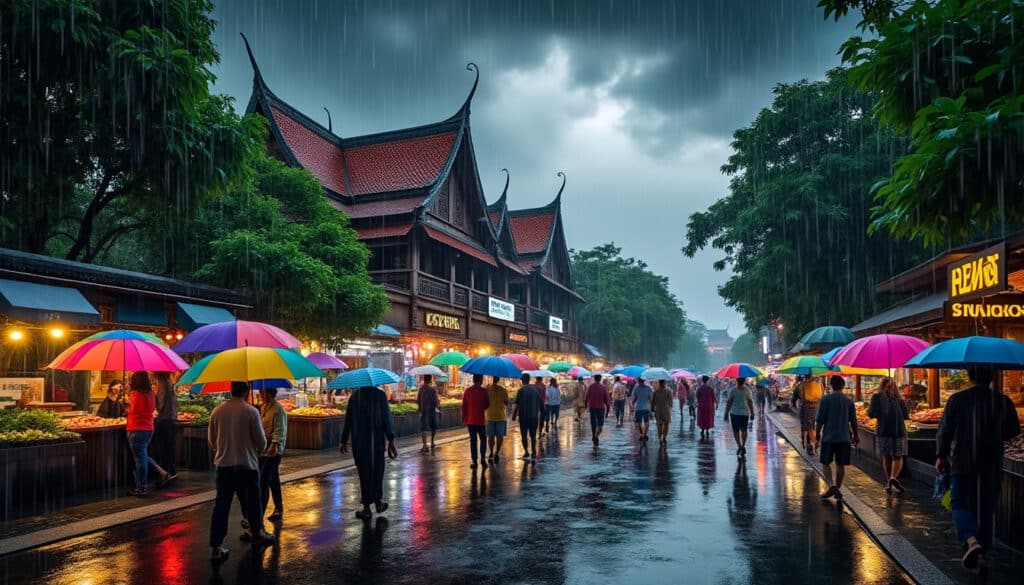
Bangkok, the vibrant capital of Thailand, is well-known for its bustling street life, cultural landmarks, and a captivating tropical monsoon climate. With travelers pouring in from all around the world to experience its warmth and hospitality, understanding the patterns of…
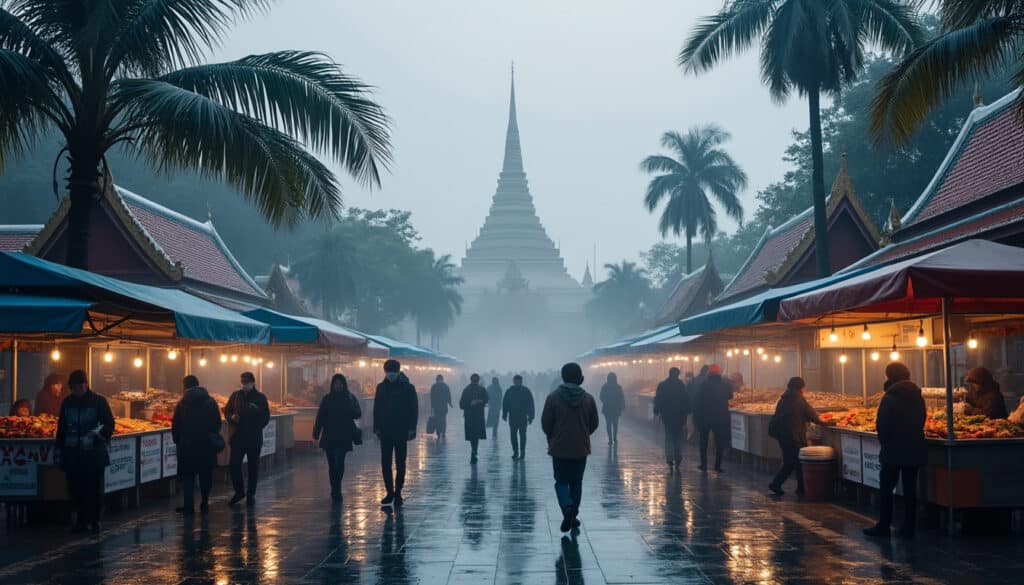
Bangkok, a city well-known for its tropical climate and bustling activity, experiences an unusual wonder when temperatures drop unexpectedly. The capital, more used to the hot sun, sees rare spells of cold weather that surprise both locals and travelers. This…
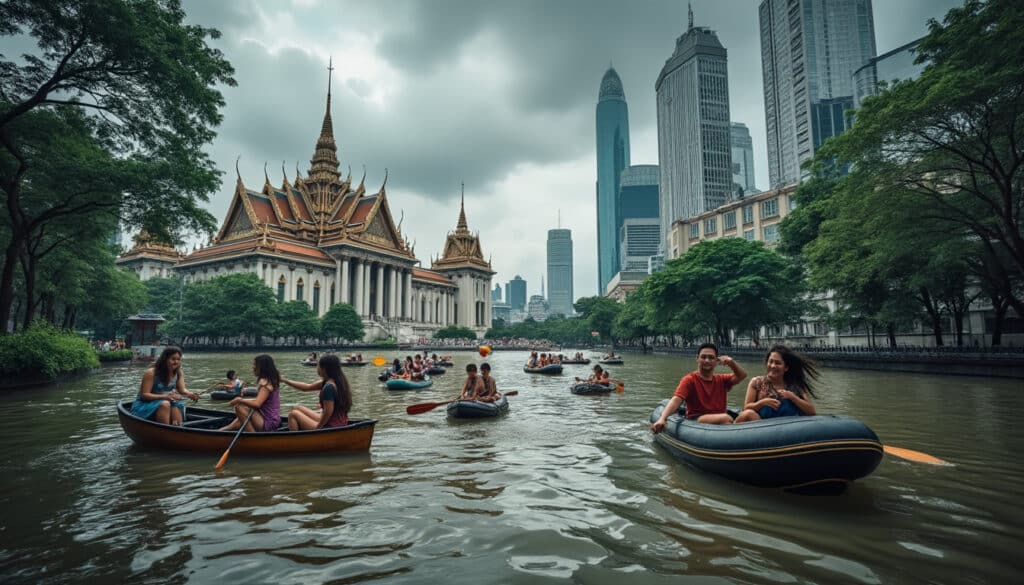
Flooding and natural risks in Bangkok
Bangkok is a city that beautifully combines traditional Thai culture with modern urban life. However, it is also a city that faces significant challenges due to the risks posed by natural disasters, particularly flooding. As climate change continues to impact…

Bangkok, a city teeming with vibrant energy and colorful street life, can boast many attractions. However, as visitors quickly discover, the city’s tropical weather plays a significant role in shaping their experiences. With temperatures routinely soaring and humidity levels remaining…

Rain and precipitation in Bangkok
Bangkok, a vibrant city renowned for its bustling markets, street food, and ornate temples, is also known for its distinctive weather patterns. Nestled along the banks of the Chao Phraya River, this metropolis experiences a tropical climate, marked by a…
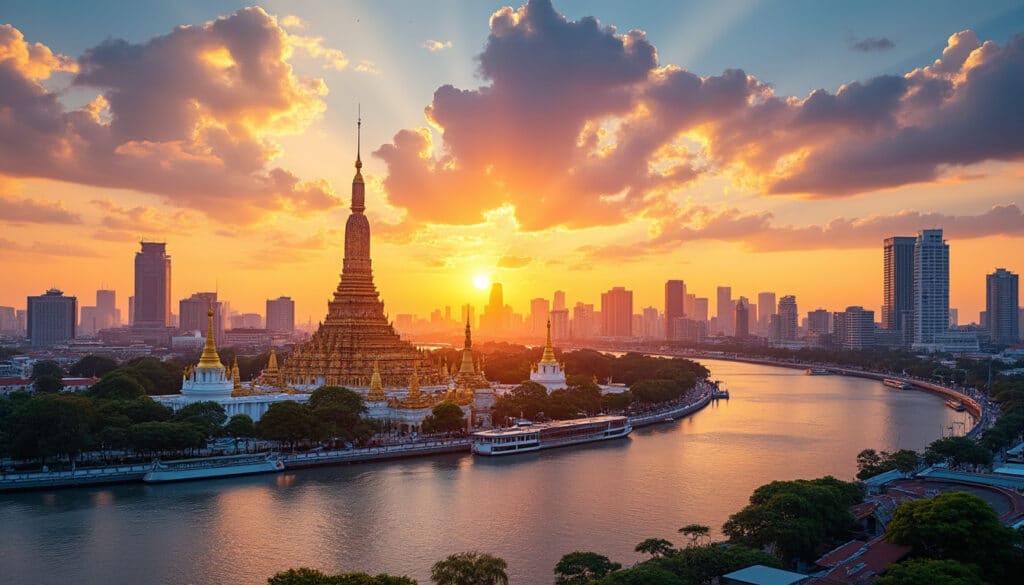
Watching the sunrise over the bustling metropolis of Bangkok can be a captivating experience. As the city awakens, an array of colors paint the sky, offering a serene start to the day. Whether you’re an early bird hoping to catch…
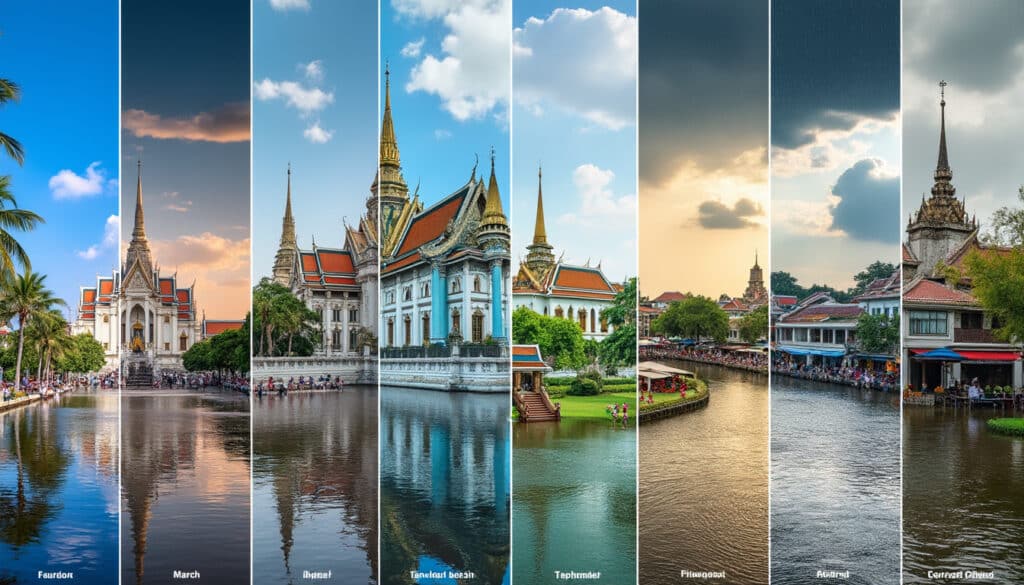
Bangkok is a city of vibrant street life and soaring temples, nestled within a tropical climate that both enchants and challenges visitors. Understanding its weather is key to making the most of any trip. This bustling metropolis experiences marked shifts…
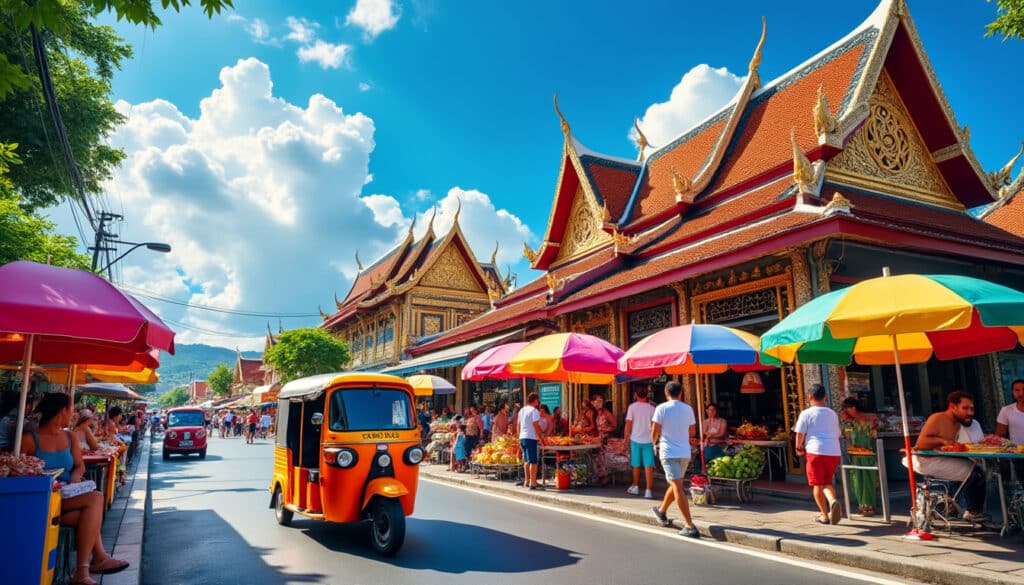
What is the weather like in Bangkok?
Nestled in the heart of Thailand, Bangkok is a bustling metropolis renowned for its rich cultural tapestry, vibrant street life, and bustling markets. But before planning a trip to this dynamic city, understanding Bangkok’s weather patterns is crucial. From intense…

